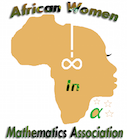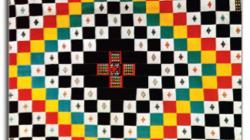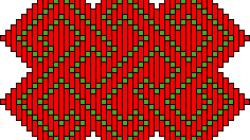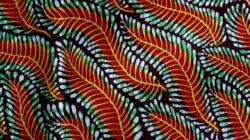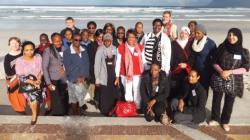The speaker, Dr Angela Tabiri is research associate at AIMS, Ghana. After graduating from the African Institute for Mathematical Sciences (AIMS) Ghana, Angela Tabiri enrolled in the ICTP postgraduate diploma in mathematics. While at ICTP Tabiri applied for and was awarded the Schlumberger Foundation Faculty for the Future Fellowship to fund her PhD in mathematics studies at the University of Glasgow. In June 2019, she graduated from the University of Glasgow with a PhD in Mathematics. Dr Tabiri is currently a Research Associate with interest in Quantum Algebra and the Academic Manager for the Girls in Mathematical Sciences Program (GMSP) at AIMS-Ghana. The GMSP nurtures the talents of secondary school girls from Ghana to unlock their potential in the mathematical sciences. She organizes Science Slam Ghana, a science communication event where researchers present their research to a lay audience in fun and engaging ways. Dr Tabiri is the founder of Femafricmaths, a non-governmental organization that promotes female African mathematicians. She interviews mathsqueens on the Femafricmaths YouTube channel to inspire young people about the different career options available when you study mathematics.
|
Conference online Link |
Register to attend:
|
| Meeting number (access code): - | |
| Meeting password: - | |
| Date | Tuesday May 31, 2022 |
| Time | 14:00-15:00 (UTC) |
| Speaker | Dr Angela Tabiri |
| Affiliation | AIMS Ghana |
| Domain | Quantum Algebra |
| Title | Decomposable curves which ar quantum Shimogeneous spaces |
| Abstract |
Let $C$ be a decomposable plane curve over an algebraically closed field $k$ of characteristic 0. That is, $C$ is defined in $k^2$ by an equation of the form $g(x) = f(y)$, where $g$ and $f$ are polynomials of degree at least 2. We use this data to construct 3 pointed Hopf algebras, $A(x, a, g), A(y, b, f)$ and $A(g, f)$, in the first two of which $g$ [resp. $f$] are skew primitive central elements, and the third being a factor of the tensor product of the first two. We conjecture that $A(g, f)$ contains the coordinate ring $O(C)$ of $C$ as a quantum homogeneous space, and prove this when each of $g$ and $f$ has degree at most 5 or is a power of the variable. We obtain many properties of these Hopf algebras, and show that, for small degrees, they are related to previously known algebras. For example, when $g$ has degree 3, $A(x, a, g)$ is a PBW deformation of the localisation at powers of a generator of the downup algebra $A(−1, −1, 0)$. |
- Find attached the slides of the talk.
-
You can find the recording video for the talk by visiting:https://univ-lille-fr.zoom.us/rec/share/JrDQkA6n5yDAD6W0oIsmjORbAHTH5Wt-Akje4snpgDrwsH8aLHZiiIF1ZxWGurfB.AI9zS3CCk0weJIQu
Code secret : V1Y*W3ik
